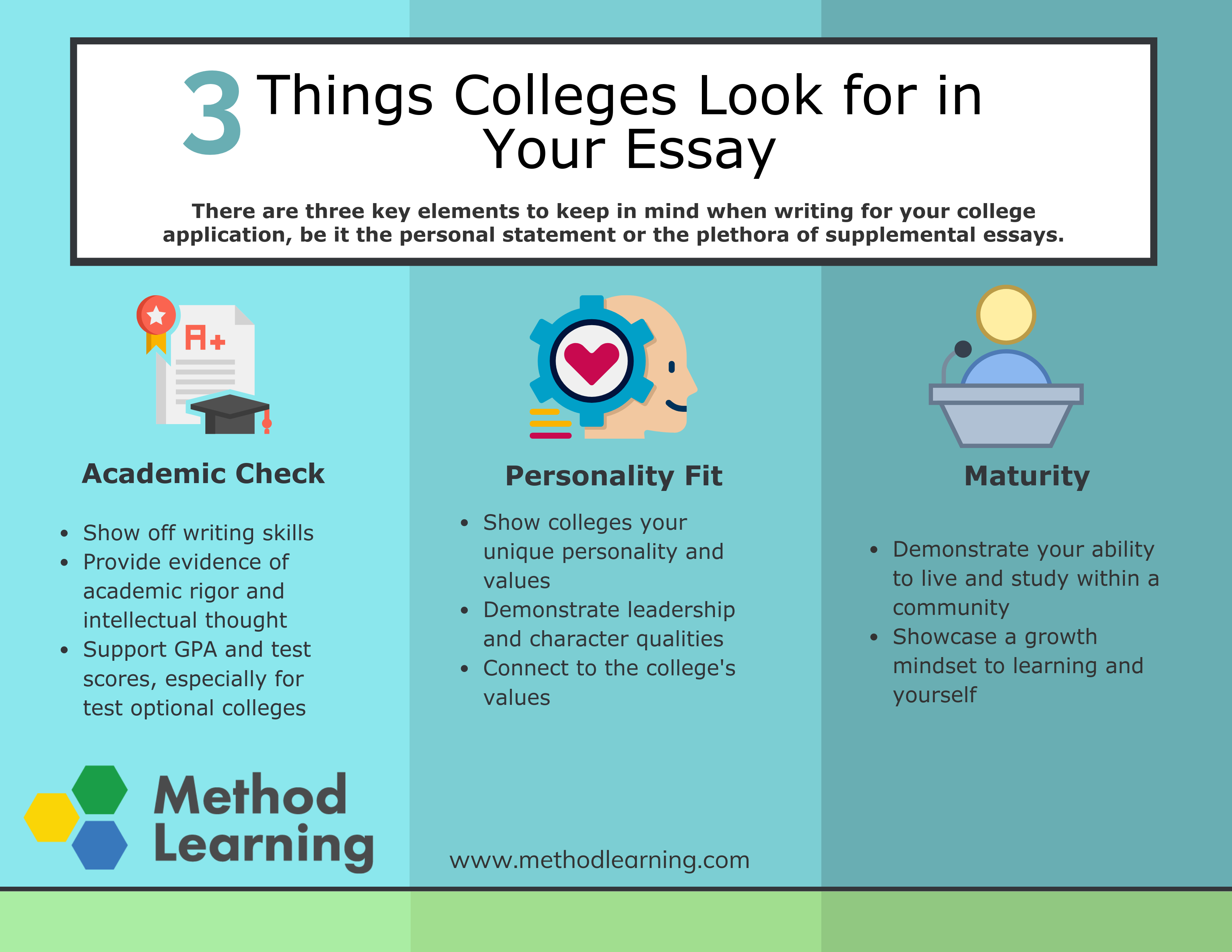When It Comes to College Essays, What are Schools Looking For?

Students and parents approach us at Method Learning asking what makes a great personal statement or what’s the best topic to bring up in supplemental essays. What we’ve seen over the years is that the topic does not matter as much as the intent behind the writing. While there are some topics that have been done to death, which we will explore in a later blog, there exists no perfect response; instead, each student should write what they feel most passionate about as that’s likely to bring out the student’s best writing.
Just because there’s no perfect topic does not mean that you can’t predict what colleges will be keeping an eye out for, though. There are three key elements to keep in mind when writing for your college application, be it the personal statement or the multitude of supplemental essays (the latter of which we covered here).

1: Academic Check
The pandemic disrupted education for students across the nation. As schools scrambled to figure out how to best grapple with COVID-19, students moved to virtual classrooms. Some students remained online for over a year, while others went through a school year of hybrid learning, and learning results varied. You might be someone who excelled with virtual education, or you might be someone who desperately wanted to be back in the classroom. Either way, colleges now have a more difficult time evaluating what your GPA means. It might be unfairly low as you’re not someone who did well in a virtual setting or it might be a little inflated as teachers struggled with how to grade during a once-in-a-lifetime crisis.
Therefore, your essay should aim to show off your writing skills even more than usual since your GPA won’t be as revealing as normal. This goes doubly if you’re not submitting ACT/SAT scores (we always recommend submitting them unless your research shows your score to be below the mid-50% of accepted students. Need help finding that information? We can help!). Admissions officers have lamented that ACT/SAT optional policies and the unreliability of pandemic-affected GPAs have made their jobs more difficult. Why not make certain that your essay gives them an academic data point that they can trust?
If you can use your personal statement and supplemental essays to showcase your writing skills, that’s going to stick out to any admissions officers who feel uncertain about how to weigh your GPA. Far too many college composition professors lament the quality of first-year students’ essays, especially over the past two years; if you provide well-written pieces, you’ll be letting colleges know you’re going to excel in any courses that require composition.
Long story short, your essays hold more weight than they used to.
2: Personality Fit
Students are sometimes surprised when they’re told that schools look at essays to see if a student’s personality will be a solid fit for that school. Some students protest, saying that it’s not fair to be judged in this way, considering college is mainly for academics.
That’s an understandable objection, but schools looking at personality fit can work in your favor, too. The fact of the matter is you don’t want to go to a school that’s a poor match for you. The college will not be enjoyable, and your grades will almost certainly suffer. For instance, an introvert going to a huge party school might not be the best idea.
But an introvert going to a small school? They might thrive there! So, when a school looks to see if you vibe with their atmosphere, you can come out ahead. This is one reason why it’s worth working with a college advisor, such as the ones here at Method Learning, to establish what schools are right for you and make sure that your essays accurately reflect who you are, so the school knows you fit the student type they are looking for. If you try to present yourself as someone different, you’re setting yourself up for trouble in the long run.
Personality can mean a lot of things, too. It’s not just about whether someone is an extrovert or an introvert, as some schools are specifically interested in accepting students with leadership qualities, or others might be focused more on social justice activism or religious participation. Colleges tend to be open about the type of student they are looking for, so it can pay off to put in a little time researching what values a college wants to see reflected in the student body.
3: Maturity
One reason we’ll be discussing do’s and don’ts of application writing in the next blog is that there are some topics that might reflect poorly on a student even if they do not realize it. You see, schools look at what students write with the student’s level of maturity in mind in addition to academics and cultural fit. This goes doubly for schools that have a large dorming population.
It makes sense. Think about the type of people you want over at your own house. Don’t you want to know ahead of time that they’ll be good visitors and not be someone who is disruptive, leaving you with a mess to clean up? The same goes for colleges. They want to know that their dorms will be safe and that classes will go smoothly. So having students who stick out as lacking in maturity or as having potential discipline problems will not be looked kindly upon when it’s time to make admission decisions.
In short, while you’re showing off your personality in your writing, make sure that it reflects well on you. This does not mean you should brag, but it does mean that narratives in which you grow are particularly popular among college admissions officers. Growth shows maturity. Any chance you have to show leadership or generosity pays off, too. If you have had a great time volunteering, then that’s worth mentioning: it makes you look good and tends to be an enjoyable read.
Colleges can only tell so much from a transcript. Admissions officers want to get to know the real you as much as they can, and they want to make sure they are bringing someone to campus who will add to it as opposed to causing problems.
I can speak to this from experience. In grad school, a student asked one of our professors how much the personal statement mattered when it came to acceptance. The professor replied, “Mostly, we look at them to make sure someone doesn’t seem too unpleasant.”
When you’re becoming part of a close-knit community, that matters a lot.
As you look over these three key elements, it's important that you keep these in mind as you write your essay. While you do not have to address all three directly, as that could end up reading awkwardly or even cloning, rather take a reflective look at how your essay captures your academic skills, personality, and maturity. As you put in your final touches, have those around you read through your essay and provide feedback to see what they see come through in your writing. Simply alluding to some of these factors can pay dividends.


